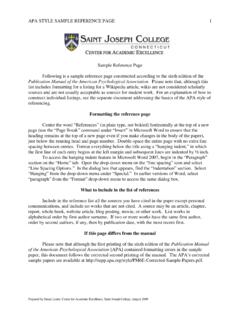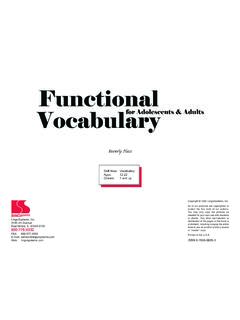Transcription of Oxford Dictionary of Idioms, 2e (2004)
1 The Oxford Dictionary of Idioms Idioms Edited by Judith Siefring OXPORD UNIVERSITY PRESS Oxford UNIVERSITY PRESS Great Clarendon Street, Oxford 0x2 6DP Oxford University Press is a department of the University of Oxford . It furthers the University's objective of excellence in research, scholarship, and education by publishing worldwide in Oxford New York Auckland Bangkok Buenos Aires Cape Town Chennai Dar es Salaam Delhi Hong Kong Istanbul Karachi Kolkata Kuala Lumpur Madrid Melbourne Mexico City Mumbai Nairobi S o Paulo Shanghai Taipei Tokyo Toronto Oxford is a registered trade mark of Oxford University Press in the UK and in certain other countries Published in the United States by Oxford University Press Inc., New York Oxford University Press 1999, 2004 The moral rights of the author have been asserted Database right Oxford University Press (maker) First published 1999 second edition 2004 All rights reserved.
2 No part of this publication maybe reproduced, stored in a retrieval system, or transmitted, in any form or by any means, without the prior permission in writing of Oxford University Press, or as expressly permitted by law, or under terms agreed with the appropriate reprographics rights organization. Enquiries concerning reproduction outside the scope of the above should be sent to the Rights Department, Oxford University Press, at the address above You must not circulate this book in any other binding or cover and you must impose this same condition on any acquirer British Library Cataloguing in Publication Data Data available Library of Congress Cataloging in Publication Data Data available ISBN 0-19-852711-X 1 Designed by Jane Stevenson Typeset in Swift and Frutiger by Kolam Information Services India Printed in Great Britain by Clays Ltd.
3 Contents Preface vii Dictionary of Idioms 1 Index 323 Preface The aim of the Oxford Dictionary of Idioms is to provide clear definitions of phrases and sayings for those who do not know what they mean, but also to offer the curious reader interesting facts about the origins of phrases and examples of their use. This second edition of the Oxford Dictionary of Idioms is based on the first edition , edited by Jennifer Speake. It maintains the first edition 's focus on contemporary and historical phrases, sayings, and proverbs, and uses a combination of definition and (where required) explanatory note and illustrative quotation to provide a rounded picture of idiomatic usage.
4 The coverage of the previous edition has been extended by the inclusion of more than 350 new idioms, and a great many contemporary illustrative quotations have also been added. These quotations have been taken from a variety of sources: from novels to travel guides, broadsheet newspapers to teenage magazines. They help to give the reader a better understanding of how an idiom is used: a typical context, a certain tone, or a particular resonance. The formation of new phrases and sayings is one of the most colourful aspects of language development, and by adding idioms such as chew the scenery, be in like Flynn, and give someone the hairy eyeball, and quotations from the likes of Anthony Bourdain, Arundhati Roy, Melvin Burgess, and Tom Clancy, the new edition hopes to reflect this colour.
5 A new index section at the end of the book groups together idioms which share a common theme or subject, so giving readers a vivid snapshot of those areas and aspects of life that have generated a particularly rich variety of figurative expressions. My thanks must go to Richard Jones for his work on sourcing quotations, to Georgia Hole for proofreading, and above all to Sara Hawker for her help and insight throughout the project. JUDITH SIEFRING A A 1 excellent; first-rate. i O The full form of this expression is >47 at ! Lloyd's. In Lloyd's Register of Shipping, the j phrase was used of ships in first-class I condition as to the hull (A) and stores (1). The ! US equivalent is A No. 7; both have been in ; figurative use since the mid 19th century.
6 From A to B from your starting point to your destination; from one place to another. 1987 K. Rushforth Tree Planting & Management The purpose of street tree planting is make the roads and thoroughfares pleasant in their own right, not just as places used to travel from A to B. from A to Z over the entire range; in every particular. 1998 Salmon, Trout & Sea-Trout In order to have seen Scotland's game fishing in its entirety, from A to Z, visiting 30 stretches of river and 350 lochs a year, you would have to be travelling for a hundred years. aback take someone aback shock, surprise, or disconcert someone. ! O The phrase is frequently used in the i passive form (be taken aback): this was ; adopted in the mid 19th century from i earlier (mid 18th-century) nautical i terminology, to describe the situation of a i ship with its sails pressed back against the !
7 Mast by a headwind, preventing forward | movement. 1991 Kathleen Jones Learning Not To Be First They were taken aback by the shabbiness of the hotel and lack of cleanliness in the city generally. ABC as easy (or simple) as ABC extremely easy or straightforward. I O From the 15th to the 17th century, a I child's first spelling and reading book was ! commonly called an ABC, and this led to the j j development of its metaphorical use, 'the | basic elements or rudiments of something'. Aa abdabs give someone the screaming abdabs induce an attack of extreme anxiety or irritation in someone. j O Abdabs (or habdabs) is mid 20th-century ! ! slang whose origin is unknown. The word is j sometimes also used to mean an attack of j delirium tremens.
8 Abet aid and abet: see AID. about know what you are about be aware of the implications of your actions or of a situation, and of how best to deal with them, informal 1993 Ski Survey He ran a 3-star guest house before this, so knows what he is about. above above yourself conceited; arrogant. 1999 Frank McCourt 'Tis Many a man made his way in America by the sweat of his brow and his strong back and it's a good thing to learn your station in life and not be getting above yourself. not be above be capable of stooping to an unworthy act. 1991 Maureen Duffy Illuminations The copyist was not above turning author or forger and several MS S from this period must be viewed as highly suspect. Abraham in Abraham's bosom in heaven, the place of rest for the souls of the blessed, dated j O The phrase is taken from Luke 16:22: 'And !
9 I it came to pass, that the beggar died, and was I j carried by the angels into Abraham's bosom', j j In the Bible, Abraham was the Hebrew i patriarch from whom all Jews traced their I descent. j acceptable the acceptable face of the tolerable or attractive manifestation or aspect of. accident 2 1996 New York Review of Books He presents himself as the acceptable face of the man who, almost single-handedly, has turned a huckster's paradise into a gangster-free zone. accident an accident waiting to happen Qa potentially disastrous situation, usually caused by negligent or faulty procedures. a person certain to cause trouble.
10 01997 Times Accidents are often said to be 'waiting to happen'. It does not take much imagination to see that the chaotic start to the Whitbread round-the-world could easily have ended in tragedy. accidents will happen however careful you try to be, it is inevitable that some unfortunate or unforeseen events will occur. ! O This phrase is a shortened form of the i early 19th-century proverb'accidents will i happen in the best regulated families'. a chapter of accidents: see CHAPTER. accord of your own accord voluntarily or without outside intervention. account give a good (or bad) account of yourself make a favourable (or unfavourable) impression through your performance or actions. settle {or square) accounts with someone 0 pay money owed to someone.}



